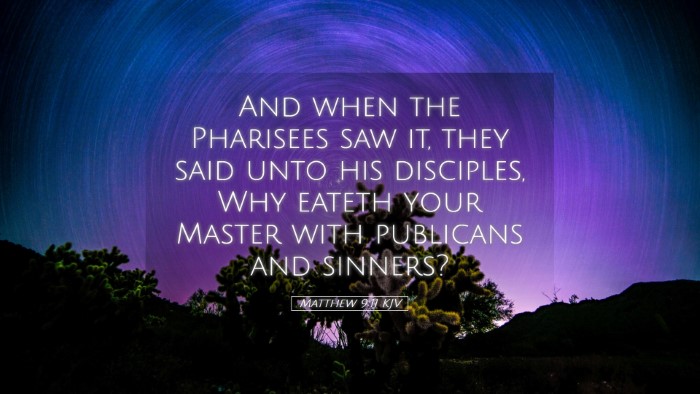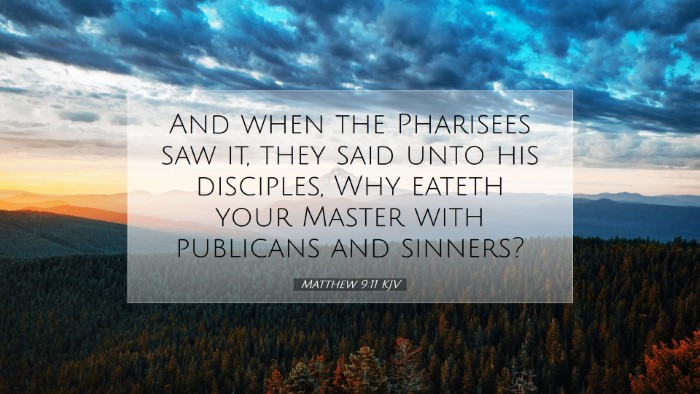Matthew 9:11 Commentary
Bible Verse: "And when the Pharisees saw it, they said unto his disciples, Why eateth your Master with publicans and sinners?"
General Overview
This verse presents a significant moment in the ministry of Jesus, revealing the tension between His mission and the attitudes of the religious leaders of the day. The Pharisees, known for their strict adherence to the Law, express their disapproval of Jesus’ association with publicans and sinners. This incident encapsulates the broader theme of Jesus' ministry: the call to the broken and marginalized.
Commentary Insights
Contextual Analysis
Matthew Henry emphasizes the backdrop of this passage, noting that Jesus has just called Matthew, a tax collector, to be His disciple. This act itself is revolutionary, as tax collectors were often viewed with disdain by society for their perceived betrayal of the Jewish people to the Roman authorities. Henry suggests that Jesus' deliberate choice of companions is a deliberate challenge to the existing social norms.
Pharisees' Critique
Albert Barnes points out that the Pharisees’ criticism stems from a misunderstanding of the nature of Jesus' mission. They equate holiness with separation from sinners, missing the fact that Jesus came to seek and save the lost. Their question reflects a broader attitude within religious circles that often prioritizes outward conformity over genuine compassion and outreach.
Jesus’ Radical Inclusion
Adam Clarke highlights the significance of Jesus eating with publicans and sinners, suggesting that such meals were communal acts with deep social and spiritual implications. Jesus’ actions demonstrate that God’s grace extends to all, thereby redefining the understanding of purity and righteousness within the community. Clarke argues that Jesus uses this moment to teach that true righteousness is concerned with the heart, not merely external observance of the Law.
Lessons for Today
- Embrace Inclusivity: The passage challenges modern believers to examine their attitudes towards those whom society labels as sinners. Like Jesus, the Church is called to engage with those on the margins, demonstrating love and acceptance.
- Reconsider Holiness: The Pharisees’ perspective represents a common misconception regarding holiness as mere separation from sin. True holiness, as modeled by Christ, involves reaching out to the broken and offering grace.
- Spiritual Health vs. Social Status: Jesus prioritizes spiritual health over social convention. In a world that often values status, this serves as a reminder that God’s kingdom is built on humility and servanthood.
Conclusion
Matthew 9:11 serves as a poignant reminder of the heart of Jesus’ ministry—one marked by radical devotion to those considered outcasts. The commentary of figures like Henry, Barnes, and Clarke elucidates the profound implications of this verse for contemporary faith communities. As followers of Christ, the challenge remains to embody His love for all people, reaching beyond societal boundaries, and embracing those deemed unworthy. In doing so, we bear witness to the transformative power of divine grace.


